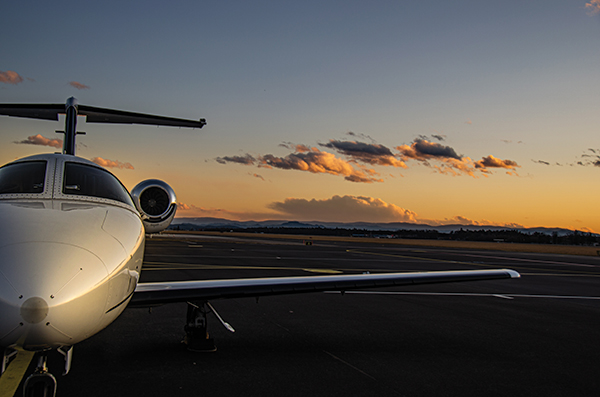More than 450 aviation companies call Kansas home and benefit from a pro-business climate, low operating costs, access to innovative resources, a highly skilled workforce and robust transportation infrastructure.
More than a century since the first plane was built in Kansas, the state’s most iconic industry is taking off. One of the five great aerospace clusters in the world, Kansas leads in aircraft design and manufacturing and has more than 34,000 people are employed in the sector across the state.
Kansas landed several significant investments and expansions from aerospace companies this year thanks to the state’s robust higher education network and specialized workforce.
Spirit AeroSystems opened its National Defense Prototype Center (NDPC) in October. The NDPC is a joint project between Kansas’ largest aerospace company and Wichita State University’s National Institute for Aviation Research (NIAR). The new research center will significantly expand the company’s capabilities and production efficiencies in the defense and space market.
The research center follows Kansas earning a designation as one of the 11 Defense Manufacturing Communities by the Department of Defense (DoD). The Defense Community Support Program encourages long-term community investments to strengthen national security innovation and expand the capabilities of the defense manufacturing industrial ecosystem.
“NIAR has been a tremendous partner in the development of the National Defense Prototype Center and enabling Wichita as a center for defense growth,” said Duane Hawkins, Spirit AeroSystems executive vice president, Defense and Space. “The NDPC provides a secure space for high-temperature materials testing, as well as development, prototyping and industrialization capabilities to support Spirit’s growth strategy targeting $1 billion of defense revenue by the mid-2020s.”
The NDPC encompasses more than 125,000 square feet of manufacturing and lab space with processing and characterization capabilities, including high-temperature testing, furnaces for fabricating and processing materials, multi-method non-destructive inspection, robotic automated fiber placement technology and a large autoclave. The center is the first of its kind, offering the ability to focus on high-temperature materials like hypersonic missiles that can withstand 2,500-5,000 degrees (Fahrenheit) temperatures. The NDPC promises to spur the development of new high-temperature materials and ultra-competitive composites.
“The more knowledge that can be generated and disseminated about high-temperature materials, the more these materials can be used, optimized, and designed for specific objectives,” said John Tomblin, Wichita State’s senior vice president for Industry & Defense Programs and NIAR executive director. “This leads to reliable and safe products that enable the industry to go further, push faster, and break through current design limitations.
Not only is this a first for the state of Kansas, but for the nation in terms of testing capacity at these temperatures.”
Kansas State University Salina Aerospace and Technology Campus recently ordered 10 Cessna Skyhawk piston aircraft from Wichita-based Textron Aviation, doubling the university’s fleet of Skyhawk aircraft. The Cessna Skyhawk is the aircraft of choice for pilot training and is the most popular single-engine aircraft in history. Textron Aviation is the state’s second-largest employer, with 9,500 employees in Wichita.
Throughout many years, Textron Aviation has established a long-term relationship with the K-State Aerospace and Technology Campus, located in Salina, Kansas. In 2019, the school took delivery of five new Skyhawks to continue to modernize its fleet. K-State was also one of the first universities to participate in Textron Aviation’s Top Hawk program, which provides selected schools with the opportunity to fly a custom branded Skyhawk for flight training and promotional activities. Deliveries of the 10 new aircraft equipped with the leading Garmin G1000 NXi avionics system are expected to begin in the first quarter of 2022.
“The addition of these aircraft is a major step toward our vision to meet industry demands by providing students experience from a primary trainer all the way to a business-class airplane,” said Alysia Starkey, CEO and dean of K-State Salina.
Collins Aerospace expands in Lenexa
Collins Aerospace officially opened its new Interiors facility in Lenexa in November. The 279,000-sq.-ft. facility is the U.S. center of excellence for Collins’ Interior Products portfolio — supporting galley inserts, oxygen systems and lighting product lines.
Collins has long had a presence in Lenexa, near Kansas City, operating out of another location since the 1960s. The new state-of-the-art building more than doubles the square footage of the previous facility with room for future expansion. The new facility has a focus on engineering, new product development, unique manufacturing processes and a robust maintenance, repair and overhaul (MRO) service area to strengthen the growth of Collins’ Interior Products portfolio and aftermarket service and support organization.
“This new facility is an investment in Collins, our customers and the Lenexa community we’ve called home for more than half a century,” said Brad Haselhorst, vice president and general manager of Interior Products at Collins Aerospace. “We’ve been fortunate to be able to tap into the talented and diverse workforce in the Lenexa and greater Kansas City area and look forward to the continued growth of our workforce here as we strive to better support our customers.”
The new Lenexa site also includes office space, an expanded laboratory space, a large manufacturing floor and loading docks for more efficient distribution.
“Our state’s place as the nation’s leader in the aviation industry and our top-tier workforce make Lenexa the perfect location to build a brand new, state-of-the-art facility,” said Governor Laura Kelly. “This announcement and the 60 jobs that it will create are great news for Lenexa and our state. I look forward to continuing our strong partnership with Collins Aerospace to create more high-paying jobs in Kansas and strengthen our growing economy.”
Mid-Continent Aviation doubles workforce in Wichita
In October, Mid-Continent Aviation Services announced plans to double its workforce and expand its footprint with a new hangar at Dwight D. Eisenhower National Airport. Mid-Continent Aviation Services (MCAS) focuses on aircraft maintenance and support, including business jet, turboprop, piston and rotorcraft products, featuring the Hawker 4000, Hawker 800 series and Beechcraft Premier models. MCAS also specializes in stocking and locating hard-to-find legacy aircraft part inventory and part solutions. MCAS is an affiliate of ICM, Inc. in Colwich, Kansas. As part of the planned growth, the company will create 23 new jobs, growing their team to over 40.
“Being located in the Air Capital of the World, the deep-rooted manufacturing skillsets of our local workforce have driven our past success — and we look forward to the next generation of growth for our team.”
— Kelly Lousch, Director of MCAS
“As a world-class MRO we are excited to expand our footprint and capabilities for our customers at Eisenhower National Airport. Being located in the Air Capital of the World, the deep-rooted manufacturing skillsets of our local workforce have driven our past success — and we look forward to the next generation of growth for our team,” Kelly Lousch, Director of MCAS, said.
Company plans include the construction of a new 31,500-sq.-ft. hangar to replace an existing 15,000-sq.-ft. hangar. The new hangar space will accommodate plans for future work and includes state-of-the-art infrastructure. It is projected the new hangar will be operational in early 2022. Total investment for the project exceeds $5.7 million.
“Wichita is home to one of five great aerospace clusters in the world. It was exciting to announce job growth from one of our important local companies on a national scale at NBAA today, and communicate how the Wichita region is the best place for aviation business,” Sedgwick County Chairman Pete Meitzner said.
National Security Crossroads
Multi-state initiative builds on Heartland’s military, high-tech ecosystem.
Governor Laura Kelly and Missouri Governor Mike Parson announced the launch of the National Security Crossroads, a bipartisan, multi-state initiative to raise awareness of and improve national security missions in the Heartland region.
“By leveraging our strategic location, strong military community, and existing cybersecurity partnerships, this initiative will make Kansas and Missouri integral to our national security for years to come,” Governor Laura Kelly said. “I look forward to the bipartisan spirit of collaboration fostered by the National Security Crossroads initiative, which will not only improve security, but will also strengthen our growing economy by developing a more agile workforce and ensuring safer communities.”
The National Security Crossroads represents a regional branding effort to bring awareness in all levels of government, as well as around the country, of the expanding base of security-related operations in the area. As the “heartland” of the United States, with a convenient location to all areas of the country, the region is poised for a strategic advantage in security and mission critical operations.
Seven major military bases are housed within the Crossroads area, covering the Army, Navy and Air Force branches. The region also includes 11 national security installations, focusing on geospatial-intelligence, net-centric solutions, non-nuclear component manufacturing, combined arms preparations, strategic attack deterrents, bio-threat prevention, along with other critical technology and infrastructure concentrations.
The Crossroads region stretches from Wichita and Manhattan, Kansas, to the bi-state St. Louis area. With the development of the National Security Crossroads, the region continues to represent a growing base of operations for a variety of installations, including military, cybersecurity, and public-private partnerships.
The program facilitates workforce and talent growth and resiliency, as well as collaboration between installations that enable Crossroads’ members to be agile and resilient. The effort also seeks to educate state and federal legislators, as well as others in the region, on the value of the Crossroads and its associated missions.
The National Security Crossroads was a concept developed at the Kansas City National Security Campus (KCNSC) to facilitate regional cooperation, collaboration, and other initiatives such as workforce development. The KCNSC is managed and operated by Honeywell Federal Manufacturing & Technologies (FM&T), LLC.
“The National Security Crossroads is a means for federal agencies to draw in potential partners and suppliers who can strengthen national security and velocity through an affiliated network,” Eric Wollerman, Honeywell FM&T President, said. “The Crossroads enables a smart network of partners to leverage contacts and information effectively throughout the region.”

